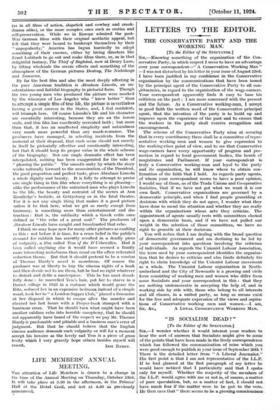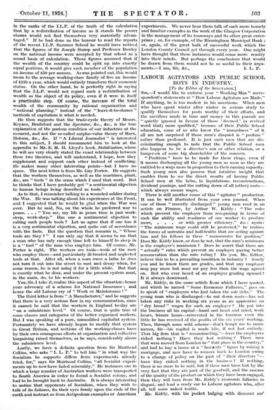"IS SOCIALISM DEAD? "
[To the Editor of the SPECTATOR.] Sra,—I wonder whether it would interest your readers to hear the sort of answers that Socialists might give to some of the points that have been made in thelively correspondence which has followed, the communication of mine which you were.good enough to publish in your issue.of September-20th? There is the detailed letter from "A Liberal Journalist." His first point is that I am not representative of the I.L.P. If he had glanced at the first paragraph of my letter he would have noticed that I particularly said that I spoke only for myself. Whether the majority of the members of
the would.agree. with me or not is, of course, .a matter of pure speculation, but, as a. matter of fact, I should not have much fear if the matter were to be put to the vote. He then says that" there seems to be a growing consciousness in the ranks of the I.L.P. of the truth of the calculation • that by a redistribution of income as it stands the poorer classes would not find themselves very materially advan- taged." If he had done us the honour to read the reports of the recent I.L.P. Summer School he would have noticed that the figures of Sir Joseph Stamp and Professor Bowley on the national income were accepted by that school as a sound basis of calculation. Those figures assumed that if the wealth of the country could be split up into exactly equal portions, it would give each member of the population an income of 250 per annum. As was pointed out, this would mean to the average working-class family of five an income of 2250 a year, which would entirely transform their economic status. On the other hand, he is perfectly right in saying that the would not regard such a redistribution of wealth as the object of its policy, even if it were in itself
a practicable step. Of eotrrse, the increase of the total wealth of the community by rational organization and "national planning," instead of the " leave-it-to-chance " methods of capitalism is what is needed.
He then suggests that the trade-cycle theory of Messrs. Keynes, Brailsford and the Spectator, &c., &c., is the true explanation of the parlous condition of our industries at the moment, -and not the so-called surplus-value theory of Marx, Hobson, &c., &c. If "A Liberal Journalist" is interested in this subject, I should recommend him to look at the appendix to Mr. E. M. H. Lloyd's book, Stabilization, where he will see very clearly stated the exact relationship between these two theories, and will understand, I hope, how they supplement and support each other instead of conflicting. He makes many other interesting points—but I have no space. The next letter is from Mr. Guy Porter. He suggests that the workers themselves, as well as the machines, plant, &n, are " tools " in the sense which I used that word. But he thinks that I have probably got "a sentimental objection to human beings being described as tools."
As to that, I remember talking to a wounded soldier during the War. _ He was talking about his experiences at the Front, and I suggested that he would be glad when the War was over. But he said, No, on the whole he preferred war to peace.. . . "You see, my life in peace time is just work- sleep, work-sleep." Has one a sentimental objection to calling such people tools ? Let us agree that if one has it is a very sentimental objection, and quite out of accordance with the facts. But the question that remains is, "Whose tools are they ? " I can only say that it seems to me that a man who has only enough time left to himself to sleep in is a " tool " of the man who employs him. Of course, Mr. Porter is Tight. The workers are tools—tools of the men who employ them—and particularly ill-treated and neglected tools at that. After all, when a man owns a lathe he does not turn it out into the street to rust and decay when, for some reason, he is not using it for a little while. But that is exactly what he does, and under the present system must, in the main, do, to his workers: You, Sir, I take it, realize this aspect of the situation : hence your advocacy of a scheme for National Insurance ; and hence the old Labour cry of "Work or Maintenance ! "
The third letter is from "A Manufacturer," and he suggests that there is a very serious flaw in my communication, since it cannot be said that the workers in England to-day are "on a subsistence level." Of course, that is quite true of some classes and categories of the better organized workers. But I was speaking of a pure, unmodified capitalist system. 'Fortunately we have already begun to modify that system in Great Britain, and sections of the working-classes have by their own courageous efforts at organization and collective bargaining raised themselves, as he says, considerably above the subsistence level.
Lastly, we have a definite question from Sir Muirhead Coffins, who asks "I. L. P." to tell him "in what way the Socialism he supports differs from experiments already tried, for," says Sir Muirhead Collins, "all Socialist experi- ments up to now have failed miserably." He instances one in which a large number of Australian workers were transported to South America in order to found a Socialist colony, and had to be brought back to Australia. It is always interesting to notice that opponents of Socialism, when they wish to talk of its failures, fix their eyes firmly upon the ends of the earth and instruct us from Antipodean examples or American experiments. We never hear them talk of such more homely and familiar examples as the work of the Glasgow Corporation in the management of its tramways and its other great enter- prises ; or, for example, of the Birmingham Municipal Bank ; or, again, of the great bulk of successful work which the London County Council get through every year. One might have thought that these instances would come more readily into their minds. But perhaps the conclusions that would be drawn from them would not be so useful to their argu-











































 Previous page
Previous page